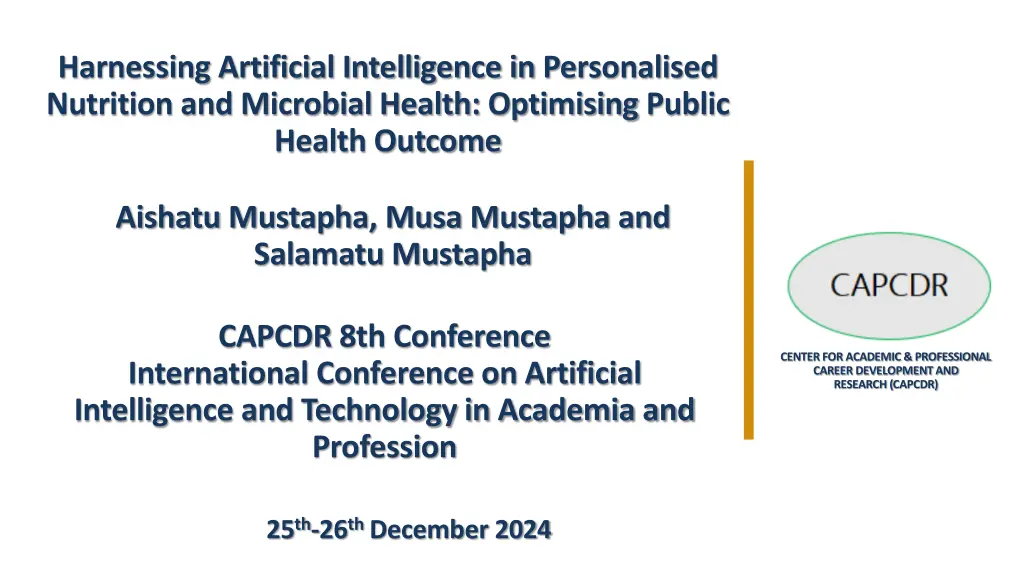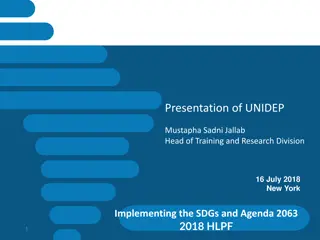
Artificial Intelligence in Nutrition and Microbial Health
Discover how Artificial Intelligence is revolutionizing personalized nutrition and microbial health to optimize public health outcomes. Learn about the role of AI in tailoring diet plans, analyzing gut microbiome data, and advancing chronic disease management. Explore the intersection of personalized nutrition and microbial health, along with ethical considerations and challenges in AI implementation. Stay informed on the latest developments in harnessing AI for health solutions.
Download Presentation

Please find below an Image/Link to download the presentation.
The content on the website is provided AS IS for your information and personal use only. It may not be sold, licensed, or shared on other websites without obtaining consent from the author. If you encounter any issues during the download, it is possible that the publisher has removed the file from their server.
You are allowed to download the files provided on this website for personal or commercial use, subject to the condition that they are used lawfully. All files are the property of their respective owners.
The content on the website is provided AS IS for your information and personal use only. It may not be sold, licensed, or shared on other websites without obtaining consent from the author.
E N D
Presentation Transcript
Harnessing Artificial Intelligence in Personalised Nutrition and Microbial Health: Optimising Public Health Outcome Aishatu Mustapha, Musa Mustapha and Salamatu Mustapha CAPCDR 8th Conference International Conference on Artificial Intelligence and Technology in Academia and Profession CENTER FOR ACADEMIC & PROFESSIONAL CAREER DEVELOPMENT AND RESEARCH (CAPCDR) 25th-26th December 2024
PRESENTATION OUTLINE 1. Introduction/ Background 2. AI in Personalised Nutrition 3. AI in Microbial Health 4. Intersection of Personalised Nutrition and Microbial Health 5. Public Health Implications 6. Ethical Considerations and Challenges 7. Conclusions 8. References
INTRODUCTION/ BACKGROUND AI's Role: Artificial Intelligence (AI) is reshaping personalized nutrition and microbial health by analyzing vast amounts of biological data to tailor health solutions (Alsulimani et al., 2024). Chronic Disease Management: AI can help address chronic diseases such as obesity, diabetes, and cardiovascular diseases by enabling more accurate predictions, personalized diets, and lifestyle recommendations (Kurniawan et al., 2024; Liu et al., 2020). Challenges: Despite its promise, AI faces challenges such as data privacy concerns, the need for high- quality datasets, and the risk of algorithmic biases that could affect healthcare equity (Celi et al., 2022) Figure 1: AI's Role in Personalised Nutrition and Microbial Health
AI IN PERSONALISED NUTRITION Tailored Diets: Personalized nutrition focuses on 4 creating diet plans based on individual genetics, metabolism, and gut microbiome, ensuring better health outcomes by meeting the unique nutritional needs of each person (Simon et al., 2023) AI Technologies: AI uses machine learning algorithms to analyze genetic data, dietary habits, and health metrics. These technologies allow real-time adjustments to health recommendations, optimizing nutrition based on changing conditions (Barberis et al., 2022; Buch et al., 2023). Case Studies: Platforms like DNAfit, Lumen, and Nutrino use AI to provide tailored nutrition advice based on users' genetic information and metabolic response (Petti & Bojko, 2023; Lee et al., 2022). Figure 2: Venn Diagram Genetics, Metabolism and Microbione
AI IN MICROBIAL HEALTH Gut Microbiome s Role: The gut microbiome plays a crucial role in regulating metabolism, immunity, 5 and disease development. Imbalances in the microbiome are linked to conditions such as obesity, autoimmune diseases, and gastrointestinal disorders (Burr et al., 2020) AI Applications: AI technologies analyze microbial data to identify patterns and predict potential health risks. These models can assist in diagnosing diseases earlier and in developing personalized treatments based on microbiome health (Saxena et al., 2024). Case Studies: Companies like Viome use AI to profile the microbiome suggest dietary recommendations to improve gut health (Branda & Scarpa, 2024 and personalized Figure 3: Human Gut Microbiome: Bacteria and Their Roles in Health
INTERSECTION OF PERSONALISED NUTRITION AND MICROBIAL HEALTH Diet and Microbiome: The food we consume 5 influences the composition of our gut microbiome, which, in turn, affects our metabolism, immunity, and overall health. A balanced microbiome is essential for optimal health (Toubal et al., 2020; Kurniawan et al., 2024). AI Integration: By combining AI-driven insights from personalized nutrition and microbiome health, we can create holistic health interventions that optimize diet and gut health together, improving both short- and long-term health outcomes (Barone et al., 2021; Vegesna, 2024). Figure 4: A-driven Personalised Nutrition and Microbome Optimisation for Better Health
PUBLIC HEALTH IMPLICATIONS Chronic Disease Prevention: AI-driven interventions in personalized nutrition and microbial health have 5 the potential to significantly reduce the incidence of chronic diseases, such as diabetes, obesity, and cardiovascular conditions, globally (Mumtaz et al., 2023). Global Health Benefits: AI can improve public health outcomes and reduce the burden on healthcare systems (Saxena et al., 2024). Figure 5: Impact of AI on Chronic Disease Reduction and Healthcare Cost Savings
ETHICAL CONSIDERATIONS AND CHALLENGES Data Privacy: As AI analyzes sensitive health data (e.g., genetic information and microbiome profiles), 5 ensuring the privacy and security of this data is crucial to maintaining public trust and complying with regulations like GDPR and HIPAA (Milani et al., 2023; Celi et al., 2022). Bias and Fairness: AI models must be designed to be fair and unbiased to avoid perpetuating health disparities. There is a need for diverse and representative datasets to train AI systems in a way that benefits all population groups equally (Chen et al., 2024; Goirand et al., 2021). Regulatory Frameworks: Clear regulatory guidelines are essential to ensure that AI applications in healthcare meet safety, ethical, and legal standards. Governments and organizations must collaborate to develop frameworks that govern AI s role in healthcare (Elendu et al., 2023; Kaur et al., 2020).
CONCLUSION AI s Transformative Potential: AI holds the potential to transform personalized nutrition and microbial 5 health, offering solutions that can optimize health outcomes at an individual and population level. Addressing Challenges: It is crucial to continue addressing challenges such as data privacy, fairness, and algorithmic biases to ensure AI s successful integration into healthcare. Future Research: Further research is needed to refine AI models, ensure ethical standards, and integrate these technologies effectively into healthcare systems worldwide. Figure 5: AI Transformative Potential
REFERENCES Alsulimani, A., Akhter, N., Jameela, F., Ashgar, R. I., Jawed, A., Hassani, M. A., & Dar, S. A. (2024). The Impact of Artificial Intelligence on Microbial Diagnosis. Microorganisms, 12(6). https://doi.org/10.3390/microorganisms12061051 Barberis, E., Khoso, S., Sica, A., Falasca, M., Gennari, A., Dondero, F., Afantitis, A., & Manfredi, M. (2022). Precision Medicine Approaches with Metabolomics and Artificial Intelligence. International Journal of Molecular Sciences, 23(19). https://doi.org/10.3390/ijms231911269 Barba-Orellana, S., Barba, F. J., Quilez, F., Cuesta, L., Denoya, G. I., Vieira, P., Pinto, C. A., & Saraiva, J. A. (2020). Nutrition, public health, and sustainability: An overview of current challenges and future perspectives. Agri-Food Industry Strategies for Healthy Diets and Sustainability: New Challenges in Nutrition and Public Health, 3 50. https://doi.org/10.1016/B978-0-12-817226- 1.00001-1 Barone, M., D Amico, F., Fabbrini, M., Rampelli, S., Brigidi, P., & Turroni, S. (2021). Over-feeding the gut microbiome: A scoping review on health implications and therapeutic perspectives. World Journal of Gastroenterology, 27(41), 7041 7064. https://doi.org/10.3748/wjg.v27.i41.7041 Branda, F., & Scarpa, F. (2024). Implications of Artificial Intelligence in Addressing Antimicrobial Resistance: Innovations, Global Challenges, and Healthcare's Future. Antibiotics, 13(6). https://doi.org/10.3390/antibiotics13060502 Buch, A., Yeshurun, S., Cramer, T., Baumann, A., Sencelsky, Y., Zelber Sagi, S., Serebro, M., Greenman, Y., Mor, M., & Eldor, R. (2023). The Effects of Metabolism Tracker Device (Lumen) Usage on Metabolic Control in Adults with Prediabetes: Pilot Clinical Trial. Obesity Facts, 16(1), 53 61. https://doi.org/10.1159/000527227 Burr, A. H. P., Bhattacharjee, A., & Hand, T. W. (2020). Nutritional Modulation of the Microbiome and Immune Response. The Journal of Immunology, 205(6), 1479 1487. https://doi.org/10.4049/jimmunol.2000419 Celi, L. A., Cellini, J., Charpignon, M. L., Dee, E. C., Dernoncourt, F., Eber, R., Mitchell, W. G., Moukheiber, L., Schirmer, J., Situ, J., Paguio, J., Park, J., Wawira, J. G., & Yao, S. (2022). Sources of bias in artificial intelligence that perpetuate healthcare disparities A global review. PLOS Digital Health, 1(3 March). https://doi.org/10.1371/journal.pdig.0000022 Chen, F., Wang, L., Hong, J., Jiang, J., & Zhou, L. (2024). Unmasking bias in artificial intelligence: a systematic review of bias detection and mitigation strategies in electronic health record- based models. Journal of the American Medical Informatics Association, 31(5), 1172 1183. https://doi.org/10.1093/jamia/ocae060





